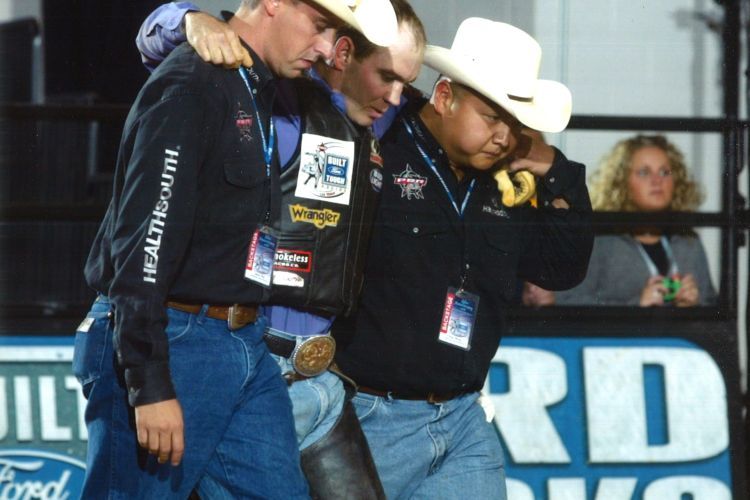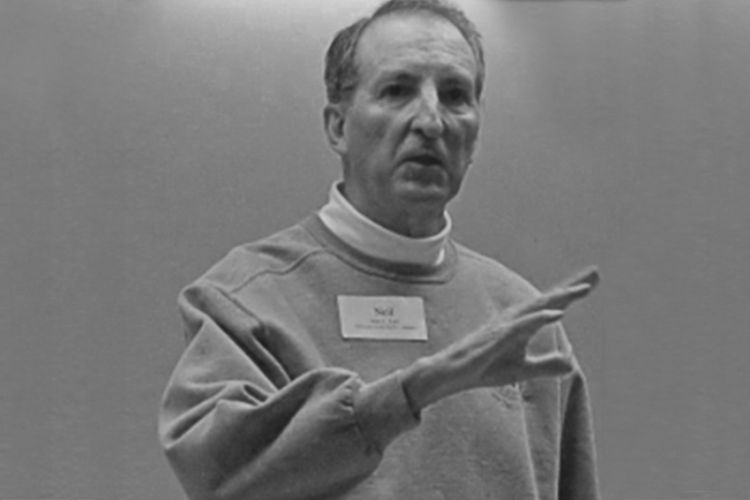Breadcrumb
Pacific instructor taking teaching by the horns

Peter Wang (far right) helps an athlete at a Professional Bull Riders event. (Photo courtesy: Andy Watson - Bull Stock Media)
University of the Pacific instructor Peter Wang’s parents never pictured their son wearing a cowboy hat and boots.
Now, they are a regular part of his wardrobe.
“My parents get a kick out of it,” Wang, an immigrant from Taiwan, said laughing.
Along with his teaching job in the Department of Health, Exercise and Sport Sciences, Wang is an athletic trainer for Professional Bull Riders, an international organization based in Colorado.
He treats and evaluates athletes before and after they ride as part of a mobile sports medicine clinic at events.
“It ranges from just your normal bruises and sprains, to minor lacerations, to concussions. Concussion evaluation and assessments is a big part of most sports nowadays, but especially in Professional Bull Riders because of the nature of the sport,” said Wang.
Wang worked with the association for 16 years before coming to Pacific after getting involved in the sport by accident.
“I always tell people I'm the furthest thing from country you can imagine,” he said.
As a graduate student at University of Nevada in Reno, Wang reluctantly volunteered at a rodeo when help was needed. He was asked to come back and quickly became hooked.
Wang still travels to 3-6 events a year—and he brings Pacific students along for the ride.
He believes it provides invaluable experiential learning in a sport unlike any other.
“I always tell people, ‘if you watch bull riding on TV, it's unique, but when it's five feet away from you, you don't realize how big the animals are and how fast they move.’ When a bull rider gets thrown down onto the ground, you actually feel the ground shake,” said Wang.
As a student on several of the trips, Ryan Carter ’18 was able to experience it first-hand—and see the valuable role athletic trainers play.
“(Wang) always said in that environment at Professional Bull Riders you could use every skill you've ever learned as an athletic trainer to its fullest,” Carter said.
“It really opens your eyes,” said Nicholas Do ’19, who majored in athletic training at Pacific.
He also went on several trips with Wang and is now an athletic training intern for football and baseball at Washington State University.
“That is one of the things I look back on (because) it was an experience that helped me with emergency situations the most. And with a setting like football, you do see a lot of emergency situations,” said Do.
Wang also brings his experience into the classroom, showing students real-world applications of the skills they’re learning with videos from his events.
For Carter, the videos highlighted how calm athletic trainers need to be in an emergency—and how much he still needed to learn.
“It was really helpful to see. It puts you in a place of what you really haven’t seen yet,” said Carter.
Carter went on to graduate school and now works as an athletic trainer for bull riding events on the weekends in addition to his full-time job at a physical therapy clinic. The job with Professional Bull Riders was something he’d never considered before taking Wang’s classes.
“With the experience that he's giving students, he plays a large role in letting you see that athletic training is not just high school, collegiate, just the generic sports you see,” said Do. “(Athletic trainers) are needed in many, many aspects.”
“The new frontier is industrial,” Wang said, with companies like Amazon, Tesla and Disney hiring athletic trainers. “A lot of the private sector have started using athletic trainers based on what we do for athletics and bringing that into more of an industrial setting,” he said.
Work for private companies can include injury prevention, evaluating injuries and doing treatments.
“One of my students works for a company that is contracting with Costco. She'll do ergonomic assessments, but she’ll also do, if somebody’s got low back pain associated with their job, she'll show them stretches and exercises, so a lot of injury prevention,” Wang explained.
But no matter the setting, Do said he learned from Wang that the most important part of the job never changes.
“Our job is to take care of the athletes, make sure that their well-being and health is at the forefront of our minds,” said Do.





